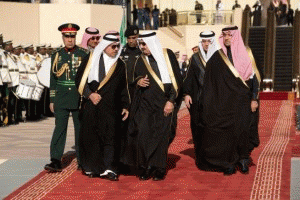Reprinted from Consortium News

King Salman of Saudi Arabia and his entourage arrive to greet President Barack Obama and First Lady Michelle Obama at King Khalid International Airport in Riyadh, Saudi Arabia, Jan. 27, 2015.
(Image by (Official White House Photo by Pete Souza)) Details DMCA
Reports that U.S. and Russian warplanes came within 10 to 20 miles of one another -- just a few seconds at supersonic speeds -- illustrates how dangerous the military situation in Syria has become. So are calls by Al Nusra, Al Qaeda's Syrian affiliate, for jihadis in the Caucasus to kill Russians in retribution for every Syrian death.
As the conflict continues to escalate, the danger of the fire spreading more broadly rises as well. In a few years, historians looking back on "The Guns of October 2015" might see it as something like this:
Like the Crash of 2008, the military conflict that flamed out of control in the Middle East in late 2015 was one of those events that are understandable in hindsight yet a total surprise when they actually occur. The crisis began several years earlier when Arab Spring protests in Syria provided the opening for a widespread revolt by the Muslim Brotherhood and other fundamentalists. But when President Bashar al-Assad took measures to suppress the revolt, the United States accused him of blocking the legitimate democratic aspirations of his people and demanded that he step down.
Increasingly fearful of a "Shi'ite crescent" stretching from Lebanon to Yemen, the arch-Sunnis of Saudi Arabia and other super-rich Arab petro-states also pitched in, flooding the rebels with "hundreds of millions of dollars and tens of thousands of tons of military weapons," as Vice President Joe Biden later put it, in an effort to promote "a proxy Sunni-Shia war" aimed at toppling Assad's supposedly Shi'ite-dominated government.
The effect was to send sectarianism to stratospheric heights. In March 2011, the Saudis and United Arab Emirates sent troops into Bahrain to protect the Sunni royal family against widespread protests on the part of the island kingdom's 70-percent Shi'ite majority. Four years later, the Saudis, along with eight other Sunni Arab states, declared war on Shi'ite Houthi rebels in Yemen, launching nightly air raids and later a ground invasion that, with U.S. technical backing, killed more than 2,300 civilian and rendered millions homeless.
The Arabian Peninsula was ringed with fire as Sunnis clashed with their Shi'ite rivals in a growing number of locales. The Saudis, dependent on an arch-Sunni Wahhabist religious establishment, bore prime responsibility for the debacle. But the U.S. fanned the flames by providing military support for its allies in Riyadh in an effort to rein in Iran, which Washington continued to regard as the prime enemy in the Middle East.
Amid such violence, Russian intervention, beginning on Sept. 30, 2015, had an explosive impact. The initiative drew condemnation from NATO, but widespread support from critics who had long complained that while attacking the terrorist organization known as Al Qaeda in a half-dozen or more countries, the U.S. had remained silent while aid flowed to Al Nusra, Al Qaeda's affiliate in Syria, and even to ISIS, a splinter group whose penchant for violence was even more extreme.
As even the notoriously blinkered New York Times observed, ISIS (also known as ISIL, Islamic State, and Daesh) continued to draw support from "private donors mainly in Qatar, Kuwait and Saudi Arabia." Five years after then-Secretary of State Hillary Clinton complained in a secret diplomatic memo that that individual Saudis "constitute the most significant source of funding to Sunni terrorist groups worldwide," it appeared that the kingdom was still allowing funds to flow to terrorist groups, up to and including Islamic State.
A Full-of-Holes Coalition
So not only was America's anti-ISIS coalition full of holes, but its efforts to support "moderate" rebels against Islamic State was fallacious since it had long been evident that the various factions cooperated on the battlefield and shared weapons. As one expert put it: "The problem is this kaleidoscopic number of opposition groups that are constantly making deals with each other. Everybody has been associated with Al Qaeda at some point."
Consequently, Russia's decision to combat all Syrian rebels -- ISIS, Al Qaeda and "Free Syrian Army" alike -- met with applause in many quarters though not in the power corridors of Washington. A humiliated Barack Obama had no choice but to shut down a much-derided $500-million program to train rebels to fight ISIS, which had generated only a few dozen fighters whom Al Nusra promptly captured or killed.
President Obama might have withdrawn entirely by that point or even opted to join forces with Russia against the fundamentalists. But pressure from Israel, Saudi Arabia and an increasingly belligerent foreign-policy establishment at home rendered that all but impossible.
With Steve Kroft of the CBS news program "60 Minutes" taunting Obama for showing "weakness" in Syria -- "He's challenging your leadership, Mr. President. He's challenging your leadership," Kroft said of Russian President Vladimir Putin -- Obama soon caved. [For more information of Kroft's extraordinary intervention, see Consortiumnews.com's "Needling Obama for More Wars."]
In short order, rebels were enjoying a bumper crop of U.S. military aid, including high-tech TOW missiles, small arms and ammo air-dropped by American cargo planes. "By bombing us, Russia is bombing the thirteen 'Friends of Syria' countries," a jubilant rebel commander said, referring to the U.S. and other nations that had called for Assad's ouster in 2011. A proxy war between the United States and Russia began to take shape.
Although the White House balked at supplying the rebels with man-portable air-defense systems, pressure mounted from neoconservative politicians and pundits. A CNN op-ed that Sen. John McCain, chairman of the Senate Armed Services Committee and a leading voice on national security issues, wrote on Oct. 13, 2015, was particularly chilling. It called on Obama to inflict severe pain on Russia and Putin regardless of the consequences:
(Note: You can view every article as one long page if you sign up as an Advocate Member, or higher).





